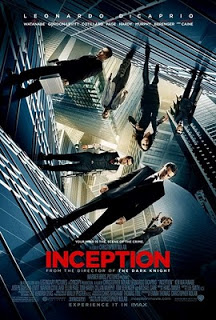This review of Inception originally appeared on Bitch Flicks in August 2010, when the film was in theatres.
The plot of Inception is deceptively simple: a tale of corporate espionage sidetracked by a man’s obsession with his dead wife and complicated by groovy special effects and dream technology. As far as summer blockbusters and action/heist/corporate espionage movies go, it’s not bad. Once you get beyond the genuinely beautiful camera work and dizzying special effects, however, you’re not left with much.
One thing that really bothers me about the film–aside from its dull, lifeless, stereotypical, and utterly useless female characters (which I’ll get to in a moment)–is that nothing is at stake. Dom Cobb (Leo DiCaprio) and his team take on a big new job: one seemingly powerful businessman, Saito (Ken Watanabe), wants an idea planted into the mind of another powerful businessman, Robert Fischer (Cillian Murphy). Specifically, Saito wants Fischer to believe that dear old dad’s dying wish was for him to break up the family business, so that, we assume, Saito wins the game of capitalism. Should the team go through with the profitable job? We aren’t supposed to care about the answer to this question or what is at stake in the plot.
It’s assumed that, of course we want Cobb to win because he’s really Leo, and, you see, Leo is talented but Troubled. What troubles him? You guessed it: a woman. A woman whose very name–Mal (played by Marion Cotillard, an immensely talented actress who’s wasted in this role)–literally means “bad.” Who or what will rescue Cobb/Leo from his troubles? You guessed it again: a woman. This time, it’s a woman whose very name–Ariadne (played by Ellen Page in a way that demands absolutely no commentary)–means “utterly pure,” and who is younger, asexual (a counter to Mal’s dangerous French sexuality) and without any backstory or past of her own to smudge the movie’s–and her own–focus on Cobb/Leo. So, it’s not a stretch here to say that Cobb needs a pure woman to escape the bad one. Virgin/whore stereotype, anyone?
SPOILER ALERT
So, what makes Mal so bad? In life, she was his faithful wife (for all we know) and mother of his two children. In the film, she’s not even a real woman, but a figment of Cobb’s imagination, haunting him with her suicide. (Note: For a better version of this story, see Tarkovsky’s Solaris, or the crappy Soderbergh adaptation starring George Clooney.) Her constant appearances threaten Cobb’s inception task, and while we can imagine a suicide haunting this hard-working man, we learn the much uglier truth later: while developing his theory of “inception,” Cobb used Mal as his first test subject–planting the idea in her mind that reality was not what she believed it to be. Now we have a main character who exacted extreme emotional violence on his wife, driving her kill herself–yet she’s the evil one.
What makes Ariadne so pure? It’s simple, really. We know she was a brilliant student of architecture, and…and…and…that’s it. The film needed an architectural dream space that wouldn’t be marred by trauma, or memory, or the like, so the natural choice would be for a computer program to design it, right? But a computer program couldn’t also counsel Cobb through the trauma of his wife’s suicide and, ultimately, coach him through killing her apparition. She is invested in getting through the job, as her life depends on it, but why does she give a damn about Cobb? Because she’s a woman architect, and women are nurturing creatures, right? So, we have a main character who exacted extreme emotional violence on his wife and threatens to kill his entire team through self-sabotage over guilt, but luckily he has one good woman to pull him through.
Is it possible to look differently at these two characters? Even if you read the movie as an allegory of filmmaking/storytelling, we’re still left with women who are sidekicks, and who serve merely as plot devices. Maria of The Hathor Legacy writes
In other words, even if you refute the realism of the film and its characters, you’re still left with some major gender trouble. Is Cobb a sympathetic character? No. Do we want his big inception job to work? Don’t care. What I care about, for the purposes of this review, is that we have–yet again–a successful mainstream movie that relies on tired tropes of female characters.
Other interesting takes on Inception:




I love that one of the labels is “Bechdel fail.” Rereading this post just made my blood boil about this movie.